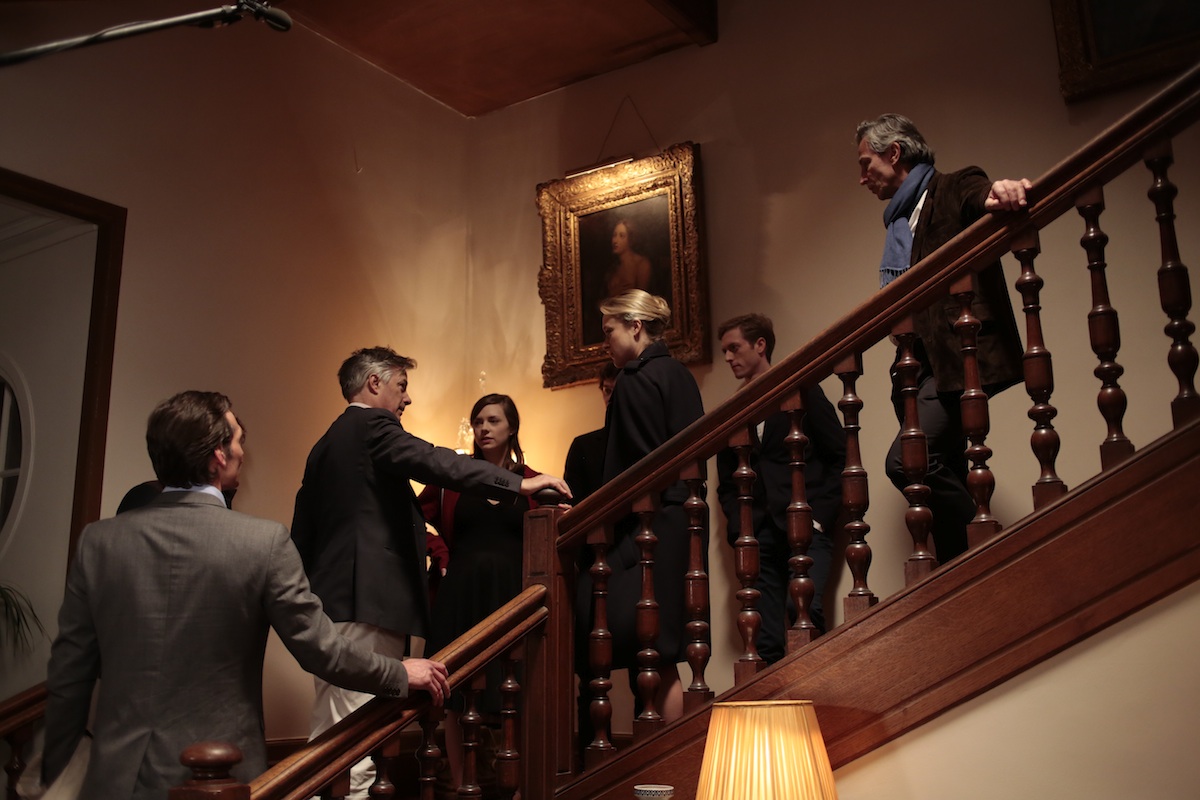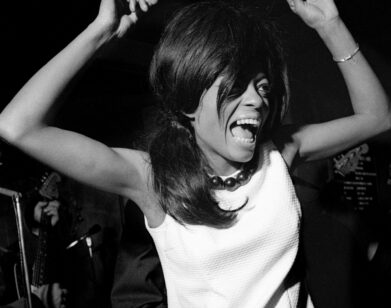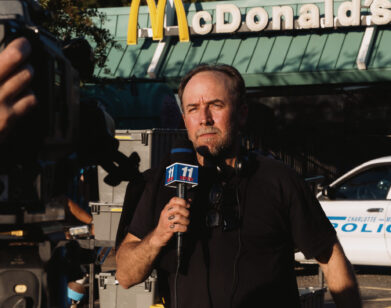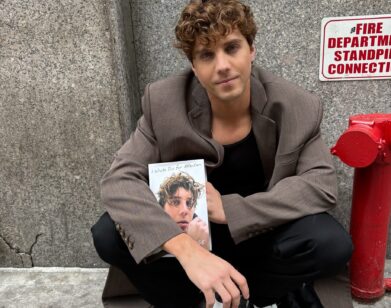A Stillman in Paris

ABOVE: WRITER AND DIRECTOR WHIT STILLMAN (SECOND FROM LEFT) WITH MEMBERS OF THE COSMOPOLITANS’ CAST. IMAGE COURTESY OF DAVID KOSKAS/AMAZON STUDIOS
“I feel no anxiety of influence,” explains Whit Stillman—writer, director, chronicler and coiner of the UHB—about his decision to set his new television show, The Cosmopolitans, among a group of young, attractive American expats in Paris. “It’s more a love of influence. If I get a chance to recreate in the present-day world, or a version of the present-day world, what I love in Fitzgerald or Salinger or even Jane Austen, I’m really happy to do that.”
That aside, “a version of the present-day world,” is key to an appreciation of Stillman. No matter where they happen to be geographically, his characters—across his four films, Metropolitan, Barcelona, The Last Days of Disco, and Damsels in Distress, and the pilot for The Cosmopolitans, which Amazon will decide whether to extend to a full six-episode series based on viewer votes—inhabit a singular universe. It exists out of time: it doesn’t feel consciously retro, but does somehow manage to magically dispense with contemporary technological concerns. In The Cosmopolitans, as ever, Stillman’s characters prefer talking—often in paragraphs—to tweeting. Like Paris itself, the show is a lovely little world in which to get lost.
ALEXANDRIA SYMONDS: Do you think that it’s generally some combination of the same factors over and over again that make young, romantic, bourgeois Americans want to move to Paris?
WHIT STILLMAN: It depends on sex, in the sense that I think men and women end up abroad for different reasons. Generalizations can be made. At least in the concept of our show, in The Cosmopolitans‘ world, there are a lot of women going over to Paris when they break up or a marriage ends. And then the guys I see going over there to find heartbreak. So the women are fleeing heartbreak and the men are looking for it. But that could just be based on my personal experience. I felt that I had no brief for living abroad. Being in Paris definitely wasn’t my idea. I was brought there. But once I was there, I had a life there and reasons for staying. I recalled that in college I had gone to Mexico and I loved it and I wanted to be in Latin America as much as I could for the rest of my life, and then Latin America became Spain, and then it became Paris. So there was the initial wanderlust.
SYMONDS: One of my favorite shots in the pilot is of Aubrey [Carrie Maclemore] walking and looking sort of forlorn against this incredibly gorgeous backdrop. Is loneliness felt more acutely when you’re someplace that lovely and that contrast is greater?
STILLMAN: Perhaps. I mean, it’s certainly more fun to watch on screen. I do think it’s one of the issues of expatriate life that you can get in a situation where you’re incredibly lonely because you really can be stranded. Sometimes you don’t realize how dependent you are on just a few people, and if they disappear, suddenly you can be thrown on your own resources, which may be limited, and you’re really in a fix. So I think that’s authentic to the experience that it might be very lonely.
SYMONDS: In your experience, how do people end up finding their communities abroad?
STILLMAN: I think crazy people are helpful, and I think that was true with Metropolitan, and that was true with The Cosmopolitans, where usually there’s sort of dynamic, crazy people who are the catalysts who make other things happen for everyone else. It’s almost as if they’re not really making things happen in their own life, but their hyperactivity is triggered for everyone else. That was my experience. There’s some people who are just very dynamic about social life, and it can be some pretty crazy stuff, but you end up meeting people you like.
SYMONDS: So that’s the best advice to give to someone who wants to leave home, is find someone crazy as soon as you can?
STILLMAN: Find someone hypersocial and crazy and try not to follow them to their doom, [both laugh] but to make friends with their nicer friends.
SYMONDS: Oh, wow. In working with Dree Hemingway, has it just gone unsaid that, “Oh, wow, your great-grandfather helped to set this Lost Generation precedent,” or is that a conversation that you had with her?
STILLMAN: And that her mother was in one of my favorite films? [laughs] We haven’t talked about it, but it’s there and it’s great. She’s a total natural. She really has a talent. Somehow it’s logical. It’s an amazing family, and it’s great to have her in the show. There is a Fitzgerald-Hemingway rivalry, and I was always very much on the Fitzgerald side and very anti-Hemingway as far as on the literary competition, but one thing that Hemingway was a genius for was always knowing the best things. Any place that Hemingway liked is a great place. I haven’t been to Havana, but old Havana must have been wonderful. Key West is wonderful. Paris and the places he liked in Paris—the Auteuil racetrack, this bar, that bar—are great. He really knew how to live and the places to choose. There’s a book called Dangerous Friends, by Peter Viertel, about his years in Paris after the war with three of these Fritz-like (Freddy Åsblom) friends: Hemingway, the director John Huston, and the director Anatole Litvak. These larger-than-life characters doing crazy things. That’s a terrific Paris story that someone should do.
SYMONDS: Was there anything specific about Paris, or even more generally about young, privileged Europeans, that you had any desire to take the piss out of?
STILLMAN: No, I don’t really operate to do that. You get in this jam of making people seem richer than they are, because it’s very hard to find locations that are actually real locations. You’re offered a place that’s rented out for weddings, and that’s the only practical place you can shoot, and so we have this palatial house for Fritz’s party. But the fellow who was part of the inspiration for Fritz was living in a not-very-impressive apartment that an Eastern European prince paid the rent for because he liked the mother, and they had no money, really. He’d give these cool parties with cool people in this rather small space. But then when we come to shoot it, you can only get into the enormous place, so it all seems much richer than it should be. I almost never portray characters I don’t have affection for, so I’m not trying to mock them. I mean, I’d mock them the way I’d mock myself.
SYMONDS: Do you have any interest in the quotidian or unglamorous concerns about expat life—things like having to deal with visas?
STILLMAN: Well, I have a personal interest in it. I’d like to know what to do about my visa. But I don’t have an interest in portraying it. I think that they [Amazon] were originally thinking of projects that had all the cliché traveler stuff in it, and I just said, “You know, if you’re over there for more than two weeks, this stuff just doesn’t matter. You don’t care anymore.” So okay, there are a lot of strikes in France, and you can find a rude waiter, but it’s just not interesting as a subject matter, it seems to me.
SYMONDS: Is there a first Paris memory that you can call to mind?
STILLMAN: Well, I was incredibly lucky. It was the greatest trip. It was when I was 10. I went with my family, and it was when the dollar was strong and my father was liquid, and I got to see General de Gaulle riding in an open car in the Bastille Day parade, and it was just an amazing trip. Beautiful. I remember going with my brother and sister to see a film in Paris, a biographical film about the Marquis de Lafayette, and then when he comes to America for the American War of Independence, it was in English. We got to see part of it in English—the rest of it was incomprehensible to us.
SYMONDS: [laughs] And when you first moved there for an extended stay that would end up lasting nine years, do you remember that first day or week in much detail? What was it like for you?
STILLMAN: Well, it was really nice when I first got there. Where I really struggled was when my first marriage was breaking up and my family was away in Spain or somewhere, and I was left alone in Paris without really knowing anyone or speaking the language. That was pretty devastating. I really took it hard. It’s a bit like in the story.
THE COSMOPOLITANS PREMIERES TOMORROW, AUGUST 28, ON AMAZON. AFTER WATCHING, VIEWERS CAN VOTE TO DECIDE WHETHER STILLMAN WILL PRODUCE SIX MORE EPISODES.






